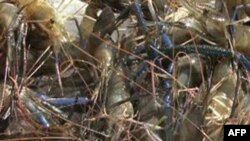Կարդացեք և լսեք անգլերեն նյութը, երկու անգամ սեղմեք տեքստի ցանկացած բառի վրա՝ «Marriam-Webster» ուսումնական բառարանից բառի սահմանմանը ծանոթանալու համար
This is the VOA Special English Agriculture Report.
A cash crop is a crop grown for money. Four hundred years ago the first cash crop for European colonists in North America was tobacco. American Indians were already growing it. Then in sixteen twelve an Englishman named John Rolfe found it would "grow well in Virginia and sell profitably in England," says tobacco.org.
But tobacco kills millions every year. Farmers face increasing government restrictions on tobacco use. They also face less demand from developed countries and more competition from developing ones.
Ներբեռնեք հոդվածը PDF ձևաչափով
Some farmers now grow niche crops instead of or in addition to tobacco. Niche crops are aimed at a particular market, but choosing what to plant can be difficult. Professor Tony Johnston at Middle Tennessee State University says most tobacco farms are relatively small.
TONY JOHNSTON: "The big issue for all the tobacco growing states is to find those small crops, those niche crops that would provide enough cash flow with fairly similar amounts of area on which you plant your crops."
Some tobacco farmers have chosen to raise prawns, or freshwater shrimp. This kind of shellfish is used in different foods and often served cold in what Americans call shrimp cocktails. The British call them prawn cocktails.
Tennessee farmer Jane Corbin says she got into this aquaculture business almost by accident.
JANE CORBIN: "I had never met anyone who had done this and I'd never seen a freshwater prawn. But I had read about it and I just thought it sounded interesting."
On a recent weekend, Jane Corbin and her sons harvested tobacco and prawns from the same field. The prawns grew for five months in a pond. The Corbins also raise cattle along with flowers, vegetables and other crops.
Jane Corbin got into aquaculture in the late nineteen nineties. Other tobacco farmers in the American South gave it a try because state and federal agencies were encouraging a change.
JANE CORBIN: "It was advertised as an alternative to your tobacco crop as far as your income was concerned. That did not ring true. That wasn't why I got into it, of course, but a lot of people did and they saw that that was not a fact."
Still, Professor Johnston says tobacco farmers are realizing they cannot depend on a single crop. The niche crops that seem to enjoy the most success, he says, are those that get consumers to visit the farm. Jee Jayme has bought prawns from the Corbins for years and enjoys helping with the harvest.
JEE JAYME: "It's their kindness and their genuine spirit that I keep on coming back here. And more especially, it's from here in the U.S., not from China or some other foreign country, but it's more here in Tennessee."
And that's the VOA Special English Agriculture Report. You can watch a video about prawn farming at voaspecialenglish.com. I'm Bob Doughty.
___
Contributing: Mike Osborne and Jerilyn Watson




